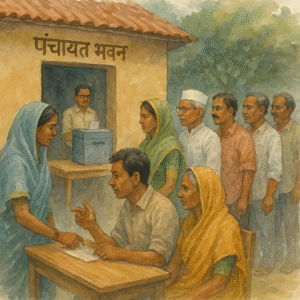Simplified Explanation of the Judgment
The Patna High Court, in a significant judgment, has upheld an ex-parte order passed by the Labour Court directing a private educational institution to pay long-pending salary dues to a former non-teaching employee. The Court dismissed the institution’s appeal, noting a consistent pattern of delay, non-cooperation, and misuse of legal remedies.
The case originated when a former clerk of Bihar College of Pharmacy filed an application under Section 33(c)(2) of the Industrial Disputes Act, 1947, claiming unpaid salary for various periods from 1990 to 2003, totaling ₹2,00,755.10. He contended that despite multiple assurances from the college management, he never received his dues.
The Labour Court initially passed an ex-parte order in favor of the employee when the college failed to file a show-cause despite having entered appearance. Although the college later moved to recall this ex-parte order, they did not comply with the condition of depositing a nominal cost of ₹300 or file their evidence and witness list. Consequently, they were again debarred, and subsequent attempts to delay proceedings were unsuccessful.
The college eventually approached the High Court, which had earlier stayed the Labour Court proceedings. However, the writ petition was dismissed for non-prosecution. The Labour Court then continued the proceedings and ruled in favor of the employee.
Before the Division Bench of the High Court in the present Letters Patent Appeal, the college raised two main legal arguments:
- That it is not an “industry” as defined under Section 2(j) of the Industrial Disputes Act.
- That the clerk (respondent) does not qualify as a “workman” under Section 2(s) of the same Act.
The High Court, however, rejected these claims. Relying on the Supreme Court’s ruling in Raj Kumar vs Director of Education (2016) 6 SCC 541, the Court reiterated that educational institutions fall under the definition of “industry”, and while teachers may not be classified as “workmen”, non-teaching staff such as clerks clearly are.
It was also observed that the employee had substantiated his claim through multiple documentary evidences, including acquittance rolls (salary registers), applications, and charts of salary dues. He had personally deposed and proven his case through oral testimony as well.
Furthermore, the Court criticized the college for attempting to delay the proceedings through repeated procedural applications while failing to engage with the merits of the case. The High Court concluded that the college had been given multiple opportunities but failed to avail them and could not now blame the courts for the ex-parte outcome.
Accordingly, the appeal was dismissed, and the Labour Court’s direction to pay the salary dues was upheld.
Significance or Implication of the Judgment
This ruling is vital for educational institutions and non-teaching employees alike. It reinforces the applicability of labor laws to private educational establishments, particularly in matters of salary disputes and service conditions of support staff.
For employees, the decision affirms that even if an employer is a private college or educational society, the protection of labor laws is available—particularly where salaries are unpaid and duties have been performed.
For institutions, the case highlights the importance of timely participation in legal proceedings. The Court’s disapproval of procedural abuse sends a strong message that justice cannot be defeated by delay tactics.
In broader terms, the judgment strengthens the enforceability of ex-parte orders passed after due process and underscores the importance of presenting a defense on time, especially when given multiple chances.
Legal Issue(s) Decided and the Court’s Decision with Reasoning
- Can a private educational institution be considered an “industry” under the Industrial Disputes Act?
- Decision: Yes
- Reasoning: As per Supreme Court precedent, private colleges qualify as “industry” under Section 2(j).
- Is a clerk in such an institution a “workman”?
- Decision: Yes
- Reasoning: While teachers are excluded, non-teaching staff fall under the definition of “workman” under Section 2(s).
- Was the Labour Court justified in passing an ex-parte order?
- Decision: Yes
- Reasoning: The employer was given ample opportunities but failed to comply. The ex-parte decision was a result of their inaction.
- Did the employee prove his claim?
- Decision: Yes
- Reasoning: He provided documentary proof and deposed as a witness. The salary records substantiated his claim.
Judgments Referred by Parties
- Raj Kumar vs Director of Education & Ors., (2016) 6 SCC 541
- Kishore Kumar Ambashtha & Ors. vs State of Bihar, 2016 (4) PLJR 929
- M/s Arun Chemicals Industries vs Certificate Officer, Bhagalpur, 2009 (1) PLJR 682
- Prem Kumar Singh & Ors. vs State of Bihar, 2009 (3) PLJR 131
Judgments Relied Upon or Cited by Court
- Raj Kumar vs Director of Education, (2016) 6 SCC 541
Case Title
Bihar College of Pharmacy vs State of Bihar & Others
Case Number
Letters Patent Appeal No.643 of 2017 in CWJC No.15055 of 2012
Citation(s)
2020 (1) PLJR 181
Coram and Names of Judges
Hon’ble Mr. Justice Shivaji Pandey
Hon’ble Mr. Justice Partha Sarthy
Names of Advocates and Who They Appeared For
For the Appellant: Mr. Arun Kumar
For the Respondents: Mr. Ajay Kumar Rastogi, AAG-10
Link to Judgment
https://patnahighcourt.gov.in/viewjudgment/MyM2NDMjMjAxNyMxI04=-BWSsCdvXIkw=
If you found this explanation helpful and wish to stay informed about how legal developments may affect your rights in Bihar, you may consider following Samvida Law Associates for more updates.








